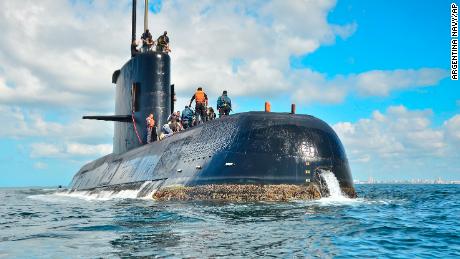"Given … the amount of time that has passed, the extreme and adverse conditions that I have been discussing, we have inferred that there is no chance of survival," spokesman Enrique Balbi said.Still, the search for the ARA San Juan, he said, remains an "active one" more than two weeks after it disappeared off Argentina's coast. "We are using all means at our disposal, both national and foreign, in the search," Balbi said. "This will obviously be key in order to conduct our investigation."Balbi had been circumspect Thursday about the crew's fate when he announced the end of the rescue mission, though he noted that the navy had allowed nearly double the amount of time it would have been possible for the crew to stay alive if the submarine remained submerged. Officials earlier had said the submarine had enough air to last seven to 10 days.His announcement Thursday shocked and angered submariners' relatives, including some who fainted or needed medical attention upon hearing the news, Susana Alvarez, a friend of one of the missing officers, told state-run news agency Télam."We feel that they are still alive," one woman told CNN affiliate Todo Noticias at that time. "Please do not suspend the rescue." Other loved ones said finding the submarine would afford a measure of closure."We already have resigned ourselves that they could be dead because of all the time that has gone," another woman told Todo Noticias. "We have to see that as a possibility."Added Alvarez: "We want to see the bodies because we need to grieve."
Search mission continues
The ARA San Juan disappeared November 15 off Argentina's coast, about midway on its journey from Usuaia in the country's south and its northern port of Mar del Plata. The search centered on an area roughly 900 kilometers (559 miles) off the Argentine coast.At the height of the search, 28 ships and nine airplanes from 11 nations — including the United States and United Kingdom — scoured the sea, backed by more than 4,000 people. The search area extended more than 480 square kilometers (185 square miles) and was roughly 900 kilometers (559 miles) from the Argentine coast. Balbi on Thursday recounted the few clues gleaned so far about the submarine's fate."Information was received from two sources of international organizations that report an anomaly and acoustics in the vicinity of the last known position of the San Juan submarine and later confirmed with an event consistent with an explosion," he said.
Balbi on Thursday recounted the few clues gleaned so far about the submarine's fate."Information was received from two sources of international organizations that report an anomaly and acoustics in the vicinity of the last known position of the San Juan submarine and later confirmed with an event consistent with an explosion," he said.
Timeline details messages, explosion-like sound
Officials this week laid out the most detailed timeline yet of the latest communication with the submarine:November 15, 12:30 a.m.: The sub's captain calls his land-based commander by satellite phone, saying that seawater has entered the vessel's "snorkel," a tube that reaches the surface to refresh the vessel's air and recharge the batteries. He says the water caused a short-circuit in the battery system in the vessel's bow and the beginnings of a fire, or smoke. The smoke was put out and the short-circuited system was isolated.The captain indicates that the battery- and diesel-powered sub would continue traveling with its stern batteries.6 a.m.: The captain types the same message and relays it to base electronically, as is protocol following a phone conversation.7:30 a.m.: The captain calls base again, this time to say that the vessel is traveling, submerged, as planned, without any personnel problems.10:31 a.m.: A sound consistent with an explosion is detected in the ocean, near the sub's last known location.There was no evidence of any attack and no more information on the cause of the noise, Balbi said last week.
Families anxious for answers
When it became clear the submarine had met with trouble, relatives of those on board gathered outside the Mar del Plata navy base, where many of the submariners were based.For weeks, they've been pushing for answers, relying on updates from the Argentine navy for a glimmer of hope that their relatives may have survived. Local school children attached messages to the fence around the base, praying for those on board, as the entire country waited for news.Word of the possible explosion at the time angered relatives, who accused the military of refusing to admit the submariners were dead. Maria Itatí Leguizamón, the wife of one of the crew members, told CNN en Espanol that she assumed those on board had not survived."They did not tell us that they are dead, but this is a logical assumption," she said. "These (expletive) knew it. They did not give an explanation. They said that CORRECTION: An earlier version of this story misstated the search location for the missing submarine. It is roughly 900 kilometers (559 miles) from the Argentine coast.
CNN's Flora Charner, Chris Dos Santos, Deb Bloom and Jason Hanna contributed to this report.
Original Article
[contf] [contfnew] 
CNN
[contfnewc] [contfnewc]





